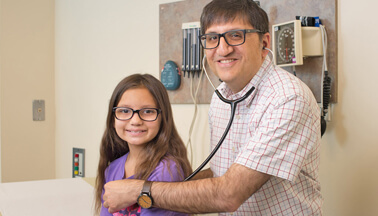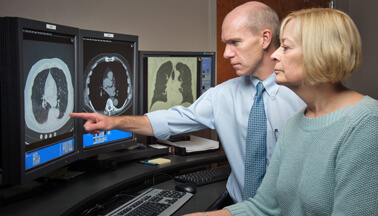Find a Doctor
Find a Doctor
View Doctors, Researchers, Nurses & More by Last Name
Search by Research Area
- Acute Coronary Syndromes
- Acute Lung Injury
- Acute Respiratory Distress Syndrome (ARDS)
- Adolescent sleep
- Adrenal Insufficiency
- Advanced cardiovascular Imaging
- Advanced Microscopy
- AI
- Air Pollution
- Air Quality
- Airway Biology
- Airway Epithelial Cell Biology
- Airway Inflammation
- Airway Stenosis
- Allergen Immunotherapy
- Allergic Rhinitis (Pediatric)
- Alpha-1 Antitrypsin Biology
- Alveolar Epithelial Cell Biology
- Analysis of bulk and single cell RNA-sequencing data
- Analysis of Data from Basic Science Experiments
- Anaphylaxis
- Antibodies
- Anti-Viral Innate Immunology
- Antivirals and Anti-Inflammatory Treatments
- Apoptosis
- Arrhythmia & Palpitations
- Aspirin-Sensitive Asthma
- Atherosclerosis
- Atypical Lung Infections
- Autoimmune Lung Diseases
- Autoimmunity
- Autoimmunity/Rheumatology
- B Cells
- Bacterial infections
- Basic Immunology
- Basic Science
- Bayesian Hierarchical Models
- Biofilm Disruption Using SOD Mimetic
- Biomedical Image Analysis
- Breathing pattern disorder
- Cancer
- Cardiac Research, Other
- Cardiac Sarcoidosis
- Cardio Oncology Database Contribution
- Cardiovascular Effects on Exercise
- Cardiovascular Health Outcomes
- Cardiovascular Imaging
- CD4+ T Helper Cell Subset Lineage Specification
- Cell Signaling
- Cellular and Molecular Biology
- Cellular Engineering
- Cellular Metabolism
- Chronic Beryllium Disease
- Chronic Obstructive Pulmonary Disease (COPD) and Viral Infections
- Chronic Respiratory Failure
- Chronic Rhinosinusitis
- Chronic Sinusitis
- Climate Change
- Coal Worker's Pneumoconiosis
- Cognitive Dysfunction in Autoimmune Disorders
- Cognitive Dysfunction in Pulmonary Disease
- Colon Cancer
- Common Gamma Chain Cytokines
- Complications of Neurologic, Neuromuscular and Skeletal Disorders
- Computational Biology
- COPDGene
- COVID-19
- CT Scan Image Analysis
- Cystic Fibrosis (CF)
- Deep Learning Methods
- Depression
- Design-based Stereology
- Developing a Mouse Model of Adrenal Insufficiency
- Diabetes, Type-1
- Diabetes, Type-2
- Diagnostic Error in Medicine
- Drug Testing of SOD Mimetics in Prevention of Adrenal Insufficiency
- Dysphagia
- Dyspnea on Exertion
- Eczema (Atopic Dermatitis) Overview
- Efferocytosis
- Emphysema
- Endothelial vascular biology
- Environmental and Occupational Diseases
- Environmental Data Science
- Eosinophilic Esophagitis
- Eosinophilic Granulomatosis with Polyangiitis (EGPA)
- Epidemiology
- Epidemiology of Chronic & Autoimmune Diseases
- Epigenetics
- Epithelial Cell Biology
- Epithelial Cells
- Exercise Induced Intracardiac Shunts
- Exercise Intolerance in Children
- Exercise-Induced Asthma (EIA)
- Exercise-Induced Laryngeal Obstruction (EILO)
- Familial Pulmonary Fibrosis
- Family and Mental Health Issues among Individuals with COPD
- Fibroblast Biology
- Fibrosis
- Food Allergies
- Food Protein Induced Enterocolitis Syndrome (FPIES)
- Functional Outcomes with Laryngeal Surgery
- Gastroesophageal Reflux and Lung Disease
- Gastroesophageal Reflux Disease (GERD)
- Gene Expression
- Generalized Linear Mixed Models
- Genetic association studies
- Genetic Associations with Musculoskeletal Disease Genetics
- Genetic Epidemiology
- Genetic Testing
- Genetics
- Genomics
- Glucocorticoid Receptor Signaling
- GWAS
- Health Behavior
- Health Disparities
- Heart Failure
- High-Throughput Data
- HIV/AIDS: Safety and Efficacy of Medications
- Host Pathogen Interactions
- Host-Pathogen Interactions in the Lung
- Human Lung Structure
- Human Macrophage Biology
- Hypersensitivity Pneumonitis
- IFN Gamma Mediate Autoinflammatory Disease
- Image Analysis
- Immune Deficiency and Immune Dysregulation Disorders
- Immune Tolerance
- Immunobiology
- Immunodeficiency
- Immunology
- Immunology
- Immunotherapy
- Impact of Cardiac Surgery in Cognitive Functions
- Improving Long Term Outcomes From Critical Illness Outcomes Research
- In Vitro Diagnostic
- Inducible Laryngeal Obstruction
- Infectious Diseases
- Inflammation
- Inflammatory Bowel Disease (IBD)
- Inflammatory Lung Disease
- Inflammatory or Degenerative Spine Disease
- Inflammatory Regulation
- Innate Immunity
- Insomnia
- Interferons and Cytokines
- Interstitial Lung Disease (ILD) Overview
- Interstitial Lung Disease ILD
- Interventional Bedside Technologies in the ICU
- Intra-vital Imaging
- Laryngeal Disorders
- Laryngeal Sensation
- Leukemia Lymphoma
- Leveraging Information Systems to Enhance Clinical Trial Recruitment
- Longitudinal and Correlated Data
- Longitudinal Data Analysis
- Lung Cancer Health Disparities
- Lung Cancer Screening Cohort
- Lung Cancer Therapy
- Lung Cell Biology
- Lung Development
- Lung Fibrosis
- Lung Inflammation
- Lung Injury and Repair
- Lymphocyte Migration
- Macrophage Biology
- Measurement Error Models
- Medical Oncology and Hematology
- Memory and Regulatory T-Cells
- Mesenchymal Stem Cells
- Meta-analysis
- Microparticles in Lung Disease
- Microvascular Remodeling Regeneration
- Military & Veterans Lung Disease
- Mind Body Treatments for Neurologic Disorders
- Mining Related Lung Diseases
- Missing Data
- Molecular Diagnostics
- Molecular Genetics
- Molecular Immunology
- Mononuclear Phagocytes
- Mood Management
- Musculoskeletal Diseases Especially Those Associated with Lung Disease
- Mycobacterial and Respiratory Infections
- Mycobacterium Abscessus and Neutrophils
- Myeloid Cells
- Nasal Polyposis
- Neurocognitive Divergence and Sleep Behaviors
- Neuromuscular Disease
- Neurosarcoidosis
- Neutrophil Biology
- NK and NKT Cell Development
- NK Cells
- Nonparametric Regression
- Obesity and Asthma
- Observational Studies and Clinical Trials
- Occupational and Environmental Lung Disease
- Order-Restricted Inference
- Osteoarthritis
- Osteoporosis
- Oxidant Injury
- Oxidative Stress
- Oxidative Stress in Arthritis and Adrenal Insufficiency
- Ozone
- Pancreatic Islets
- Pathogenesis of Pulmonary Fibrosis
- Pathology
- Patient Comfort within Office Procedures and Endoscopy
- Patient Outcomes
- Patient-Reported Outcome Measures
- Pediatric Lung Disease
- Peripheral Neuropathy
- Personalized Medicine
- Post Deployment Lung Health - Autoimmune
- Post-transcriptional gene regulation
- Pseudomonas
- Pseudomonas aeruginosa
- Pulmonary Disease
- Pulmonary Disease Research, Other
- Pulmonary Medicine
- Pulmonary Surfactant Homeostasis
- Pulmonary Vascular Disease
- Quality of Life
- Quantitative Image Analysis
- Radiation Plexopathy
- Regenerative Medicine
- Respiratory Bacterial and Viral Infections in Asthma and COPD
- Rheumatoid Arthritis (RA)
- RNA modifications
- RNA-Seq
- Role of Sinus Disease in Asthma and Lower Airway Disease
- Sarcoidosis Overview
- Schizophrenia
- Silicosis
- Single cell RNA-sequencing studies
- Sinusitis
- Sinusitis in Cystic Fibrosis
- Skin Barrier Diseases
- Skin Biology
- Sleep Apnea
- Sleep Disorders
- Sleep in Critical Illness
- Smokers with Preserved Spirometry
- Smoking Related Lung Diseases
- Spatial Point Processes
- Spatial Transcriptomics
- Sphingolipid Signaling and Metabolomics
- Statistical Methods
- Steatohepatitis
- Stress Management
- Structural Biology
- Sudden Cardiac Arrest
- Synovial Fluid Based Biomarker Discovery
- Systems Biology
- T Cell Exhaustion and Checkpoint Proteins
- T Cells
- T Follicular Helper Cell & T Follicular Regulatory Cell Function in Health & Disease
- Technology-based Interventions
- Tobacco Regulatory Science
- Transcriptional Regulation
- Translational Research
- Tuberculosis (TB)
- Type I Interferon Responses
- Type-2 Cytokine Regulation
- Type-2 Immunity & Immune Modulation During Helminth Infection
- Vascular Biology
- Vascular Lung Diseases
- Ventilation for Airway Surgery
- Viral Infections
- Virology
- Vocal Cord Dysfunction (VCD)
- Wound Healing








 You may also be interested in...
You may also be interested in...